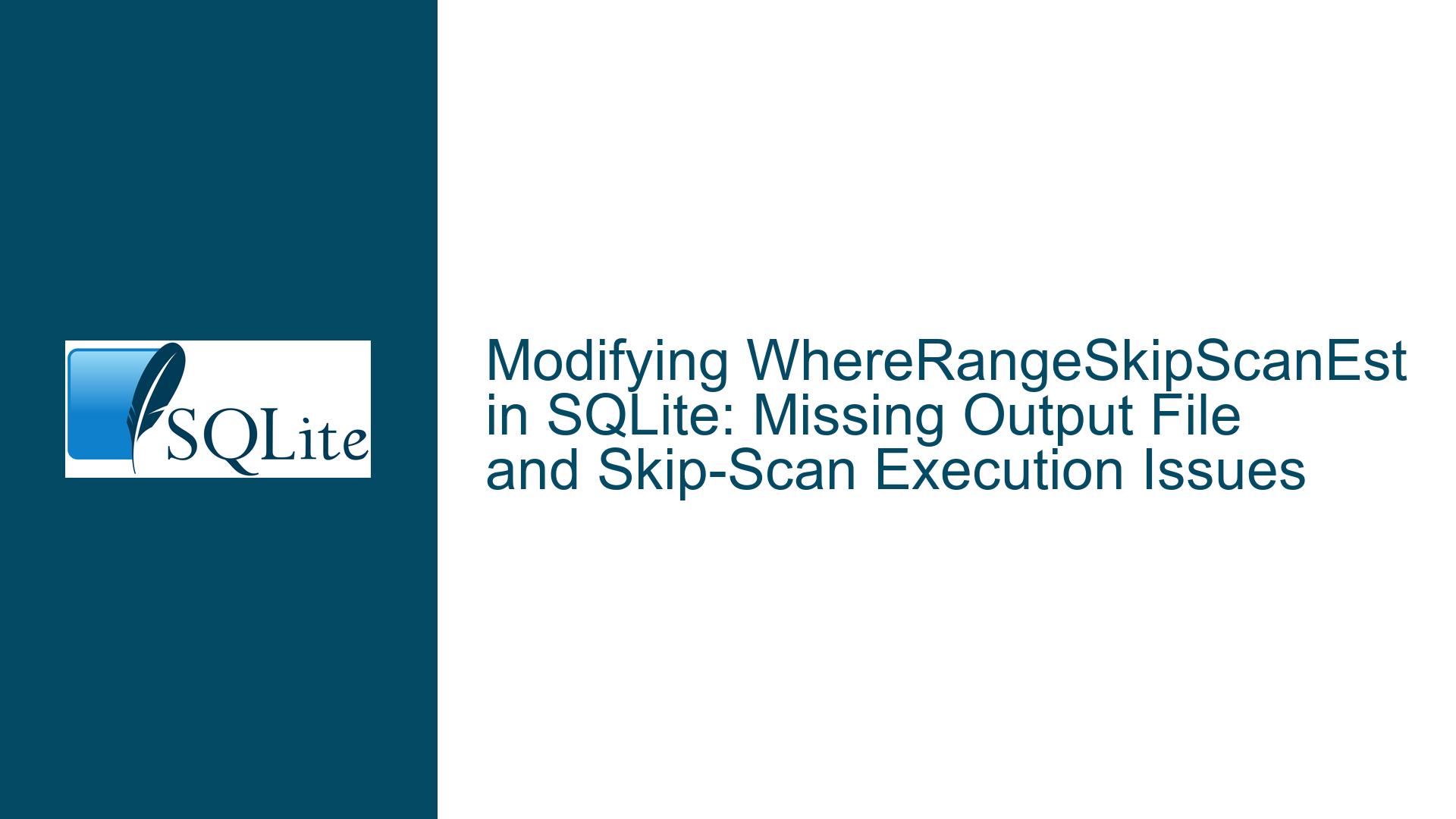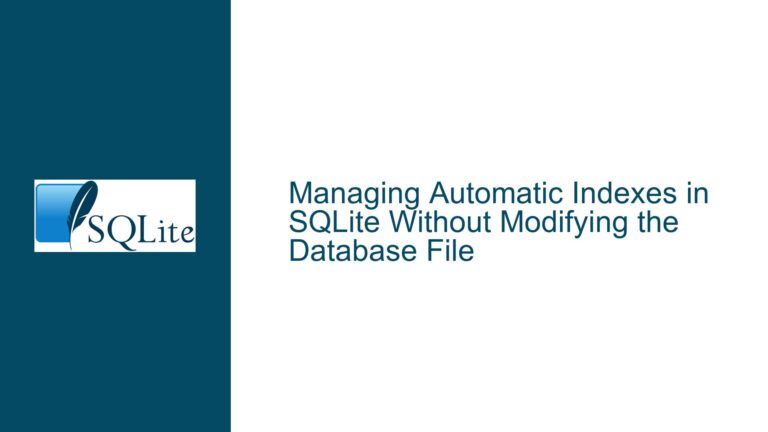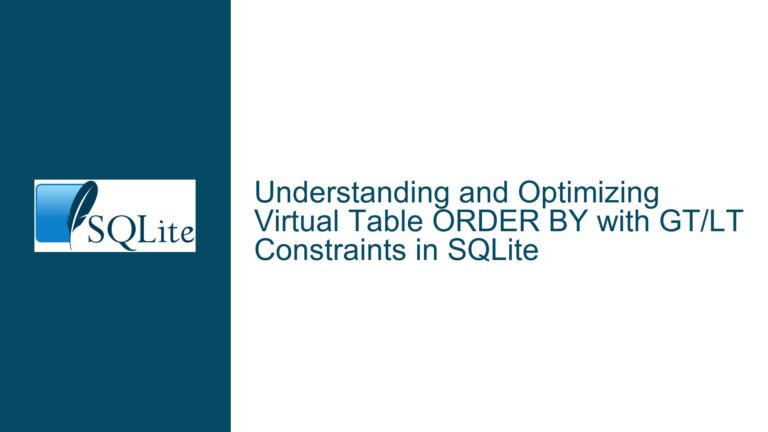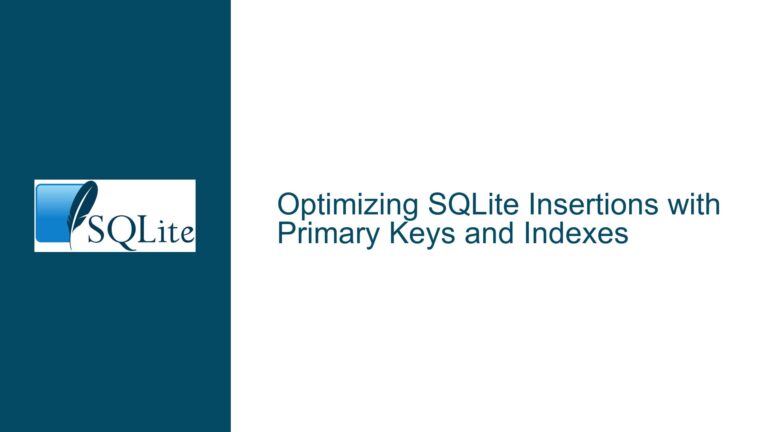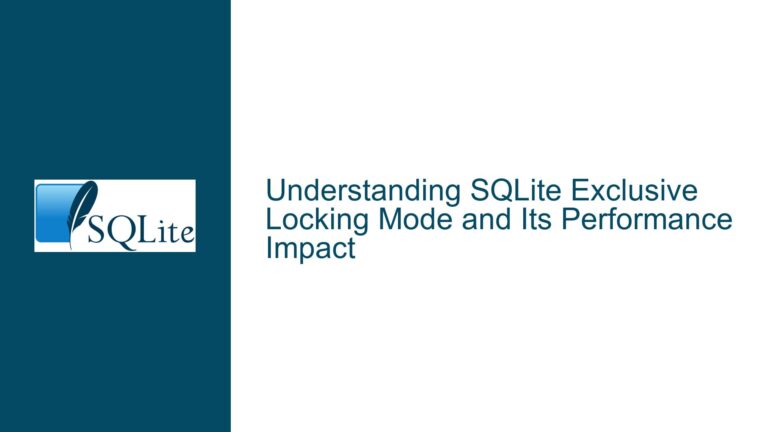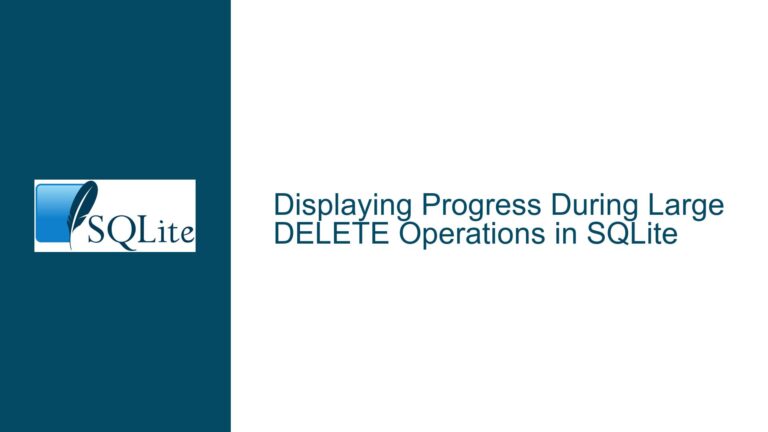Modifying WhereRangeSkipScanEst in SQLite: Missing Output File and Skip-Scan Execution Issues
Understanding Skip-Scan Estimation Behavior and File Output Failures in Custom SQLite Builds
Core Challenge: Inactive Statistical Optimization Paths and Build Configuration Errors
The fundamental challenge revolves around three interconnected phenomena in SQLite’s query optimization pipeline:
- Conditional activation of advanced index analysis routines tied to specific compile-time flags
- Statistical dependency chains controlling skip-scan eligibility
- Environmental factors affecting file system operations in modified C code
When modifying SQLite’s internal query planner functions like WhereRangeSkipScanEst, developers must account for the complex interplay between compile-time configuration, runtime statistics gathering, and filesystem security policies. The absence of expected output files (output.txt in this case) serves as a surface symptom pointing to deeper issues in build configuration, statistical precondition handling, and error chain management.
Architectural Context: SQLite’s Cost-Based Query Optimizer
SQLite’s query planner employs a hybrid cost-based and rule-based optimization strategy. The WhereRangeSkipScanEst function specifically participates in estimating the efficiency of skip-scan index searches – an optimization technique that allows partial use of multi-column indexes even when leading columns are constrained by equality and subsequent columns have range constraints.
For this estimation logic to activate, several preconditions must be satisfied:
- Statistical metadata must exist in sqlite_stat1 and sqlite_stat4 tables
- The SQLITE_ENABLE_STAT4 compile-time flag must enable histogram-based statistics
- The query structure must match skip-scan eligibility patterns
- The ANALYZE command must have generated fresh statistical profiles
Failure at any of these checkpoints prevents WhereRangeSkipScanEst from executing, thereby suppressing any debug file operations added to that code path.
File System Interaction Risks in Embedded Modifications
The addition of file I/O operations (fopen, fprintf, fclose) to SQLite’s core components introduces platform-specific vulnerabilities:
- Working directory ambiguity: The sqlite3 shell might execute from different paths than expected
- File permission conflicts: Write access may be denied in certain directories
- Resource leakage: Unclosed file handles from incomplete error handling
- Concurrency issues: Multiple processes accessing the same debug file
These factors combine to create fragile debug output mechanisms that require rigorous error checking at every filesystem interaction point.
Comprehensive Failure Analysis: Why WhereRangeSkipScanEst Remains Dormant
Build Configuration Misapplication
The SQLITE_ENABLE_STAT4 flag controls compilation of statistical analysis code, including WhereRangeSkipScanEst. Incorrect flag specification during build configuration prevents inclusion of skip-scan estimation logic.
Evidence chain:
./configure --enable-STAT4=yes → "unrecognized option" warning
SQLite’s autoconf system uses -D flags for compile-time options rather than –enable/-disable syntax. The proper invocation requires:
CFLAGS="-DSQLITE_ENABLE_STAT4" ./configure
make clean
make
Without this correction, the STAT4-related code remains excluded from compilation, making WhereRangeSkipScanEst unavailable to the query planner regardless of subsequent steps.
Statistical Metadata Absence
Even with correct STAT4 compilation, skip-scan estimation requires precomputed statistics stored in internal SQLite tables. These tables remain empty until the ANALYZE command executes against the target database.
Dependency hierarchy:
- CREATE INDEX builds index structure
- ANALYZE populates sqlite_stat1 (basic cardinality)
- ANALYZE with STAT4 enabled populates sqlite_stat4 (histograms)
- Query planner consults statistics during cost estimation
Omitting ANALYZE leaves the query planner without necessary data to consider skip-scan optimizations, bypassing WhereRangeSkipScanEst entirely.
Query Structure Mismatches
The test query must precisely match skip-scan eligibility criteria:
SELECT * FROM mock_data WHERE first_name='Ive' AND id BETWEEN 1 AND 200;
Given index i on (first_name, email, id), the WHERE clause constraints are:
- Equality on leading column (first_name)
- Range constraint on third column (id)
This appears to match skip-scan requirements, but hidden factors may interfere:
- Data type mismatches: Implicit casting of ‘Ive’ vs column affinity
- Index column order: The range-constrained column must not be preceded by unconstrained columns
- Selectivity thresholds: Planner might favor full index scans over skip-scans
File System Operation Flaws
The modified WhereRangeSkipScanEst contains multiple file handling vulnerabilities that could suppress output even when the function executes:
- Double FILE pointer declaration:
FILE *file = fopen("user.json", "r");
FILE *filePointer; // Uninitialized when first error occurs
If user.json doesn’t exist, the code attempts to write to filePointer before assignment, causing undefined behavior.
- Resource leakage pathways:
if (!file) {
fprintf(filePointer,...); // filePointer undefined
fclose(filePointer); // Invalid operation
return -1;
}
Multiple exit points lack proper cleanup of allocated resources (json_data, root JSON object).
- Insecure file paths:
fopen("output.txt", "w");
Writes to current working directory, which may differ between build environment and sqlite3 execution context.
- Error code mismatches:
return int_value; // From JSON parsing
SQLite expects SQLITE_OK (0) or error codes >0. Returning arbitrary integers violates error handling contracts.
Systematic Resolution Protocol: Activating Skip-Scan Estimation with Debug Output
Phase 1: Validating STAT4 Compilation
Step 1: Clean build environment
make distclean
rm config.status config.log
Step 2: Set compilation flags
CFLAGS="-DSQLITE_ENABLE_STAT4 -DSQLITE_ENABLE_JSON1" ./configure
(JSON1 required for json_loads() if using stock SQLite)
Step 3: Verify feature activation
Inspect config.h or config.log for:
#define SQLITE_ENABLE_STAT4 1
Step 4: Rebuild with debugging symbols
CFLAGS="-DSQLITE_ENABLE_STAT4 -DSQLITE_ENABLE_JSON1 -g" ./configure
make
Phase 2: Statistical Metadata Generation
Step 1: Initialize test database
./sqlite3 test.db
Step 2: Create schema and populate data
CREATE TABLE mock_data(first_name TEXT, email TEXT, id INTEGER);
-- Insert representative dataset
Step 3: Build indexes
CREATE INDEX i1 ON mock_data(first_name, email, id);
Step 4: Generate statistics
ANALYZE;
Step 5: Verify stat4 data
SELECT count(*) FROM sqlite_stat4;
(Should return >0 rows)
Phase 3: Query Planner Diagnostics
Step 1: Enable query plan logging
./sqlite3 test.db
.explain on
.eqp on
Step 2: Execute test query with diagnostic
EXPLAIN QUERY PLAN
SELECT * FROM mock_data WHERE first_name='Ive' AND id BETWEEN 1 AND 200;
Validate expected output:
QUERY PLAN
`--SEARCH mock_data USING INDEX i1 (first_name=? AND id>? AND id<?)
The presence of INDEX i1 with range constraints confirms skip-scan consideration.
Phase 4: Debug Output Hardening
Modify WhereRangeSkipScanEst with robust file handling:
static int whereRangeSkipScanEst(
/* ... existing parameters ... */
){
const char* debug_path = "/absolute/path/output.txt"; // Use absolute path
FILE *debug_fp = NULL;
int rc = SQLITE_OK;
debug_fp = fopen(debug_path, "a"); // Append mode for multiple runs
if( !debug_fp ){
return SQLITE_IOERR; // Propagate error properly
}
/* ... rest of logic ... */
fprintf(debug_fp, "Debug message\n");
fflush(debug_fp); // Ensure immediate write
fclose(debug_fp);
return SQLITE_OK;
}
Critical enhancements:
- Absolute paths eliminate working directory ambiguity
- Append mode allows multiple test runs without overwrite
- fflush() ensures writes persist even if process crashes
- SQLite error code compatibility
- Single FILE pointer with null checks
Phase 5: Execution Environment Verification
Step 1: Confirm file permissions
touch /absolute/path/output.txt
chmod a+rw /absolute/path/output.txt
Step 2: Test file access from SQLite shell context
strace -e openat,write,close ./sqlite3 test.db
Monitor system calls for output.txt access attempts.
Step 3: Capture function entry using debugger
gdb --args ./sqlite3 test.db
(gdb) break whereRangeSkipScanEst
(gdb) run
Confirm breakpoint hit when executing target query.
Phase 6: Error Handling Reinforcement
Implement comprehensive error checking throughout the function:
static int whereRangeSkipScanEst(...)
{
FILE *debug_fp = NULL;
char *json_data = NULL;
json_t *root = NULL;
int rc = SQLITE_OK;
debug_fp = fopen("/verified/path/output.txt", "a");
if( !debug_fp ){
rc = SQLITE_IOERR;
goto cleanup;
}
if( fseek(file, 0, SEEK_END) != 0 ){
fprintf(debug_fp, "fseek error: %s\n", strerror(errno));
rc = SQLITE_IOERR;
goto cleanup;
}
/* ... repeat for all I/O and parsing steps ... */
cleanup:
if( json_data ) free(json_data);
if( root ) json_decref(root);
if( debug_fp ) fclose(debug_fp);
return rc;
}
This structure guarantees resource cleanup and proper error propagation.
Advanced Diagnostic Techniques
1. Forced Skip-Scan Activation
Override query planner heuristics using PRAGMA directives:
PRAGMA optimize;
PRAGMA analysis_limit=1000;
PRAGMA hard_heap_limit=1000000;
SELECT * FROM mock_data
WHERE first_name='Ive' AND id BETWEEN 1 AND 200;
2. Statistical Metadata Inspection
SELECT
tbl AS table_name,
idx AS index_name,
neq AS num_equalities,
nlt AS num_less_than,
ndlt AS num_distinct_less_than
FROM sqlite_stat4
WHERE tbl = 'mock_data' AND idx = 'i1';
3. Compile-Time Feature Verification
#ifdef SQLITE_ENABLE_STAT4
fprintf(debug_fp, "STAT4 enabled\n");
#else
fprintf(debug_fp, "STAT4 disabled\n");
#endif
4. Execution Path Instrumentation
Add log markers throughout the codebase:
// In where.c near skip-scan decision points
WHERITRACE(0xffffffff,("Considering skip-scan on index %s\n", pIdx->zName));
Rebuild with:
CFLAGS="-DSQLITE_DEBUG -DSQLITE_ENABLE_WHERETRACE" ./configure
Preventive Practices for SQLite Core Modifications
Build System Hygiene
- Always
make distcleanbefore reconfiguration - Verify active flags via
sqlite3 -compileoutput - Use absolute paths for all file operations
- Always
Statistical Precondition Management
- Automate ANALYZE in test harnesses
- Monitor sqlite_stat* tables during development
- Use PRAGMA stats_always = ON; for small datasets
Error Handling Rigor
- Check return values for all system/library calls
- Use SQLite’s error reporting (sqlite3_log())
- Implement debug output as asynchronous signals
Query Planner Observation
- Regularly inspect EXPLAIN QUERY PLAN outputs
- Use
.testctrl optimizationsto disable heuristics - Cross-validate with different sqlite3 versions
Conclusion: Holistic Approach to SQLite Core Modifications
Successfully modifying SQLite’s internal query optimization components requires simultaneous attention to:
- Build-time configuration – Precise compiler flag usage
- Runtime statistical context – Proper ANALYZE execution
- System interaction hardening – Robust file I/O practices
- Diagnostic instrumentation – Multi-layer verification
The absence of expected output files when modifying WhereRangeSkipScanEst serves as a prototypical example of how SQLite’s sophisticated optimization pipeline can suppress code paths that appear logically reachable. By methodically addressing each layer of the execution environment – from compilation flags to filesystem permissions – developers can reliably activate and observe their modifications to SQLite’s core components.
